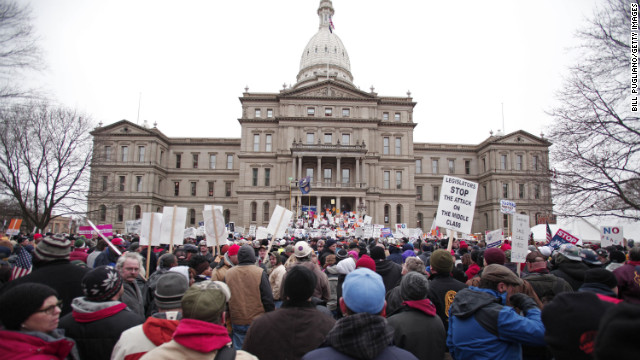Analysis: Why America's unions are losing power
By Josh Levs, CNN
updated 4:06 PM EST, Wed December 12, 2012

Sweeping law limits union power in Michigan
STORY HIGHLIGHTS
(CNN) -- Michigan has dealt a tremendous blow to unions, approving a right-to-work measure in the heart of organized labor's industrial stronghold.
The new law -- passed by legislators and signed hours later on Tuesday -- not only signals a change in America's so-called Rust Belt, but is also the latest sign that the power of organized labor is shrinking in the United States.
American unions already have a fraction of the influence they did a few decades ago. Only about 12% of workers are union members, down from 20% in 1983, according to federal data. In the private sector, the plunge has been even steeper: union membership has dropped from 17% in 1983 to 7% today.
That's partly because certain unionized industries have become a smaller part of the overall work force, particularly in manufacturing. It's also a result of government action.
Michigan has become the 24th state to adopt a right-to-work law, which removes the requirement for people to pay unions to work at unionized agencies, effectively decreasing union funding and making it less likely that workers choose to organize.
Read more @
http://www.cnn.com/2012/12/11/us/uni...html?hpt=hp_c2
."
By Josh Levs, CNN
updated 4:06 PM EST, Wed December 12, 2012

Sweeping law limits union power in Michigan
STORY HIGHLIGHTS
- Michigan is the latest 'Rust Belt' state to approve a right-to-work law
- It's the latest sign that organized labor's influence is waning in the U.S.
- Some analysts blame heavy tactics by big business; others say it's just politics
(CNN) -- Michigan has dealt a tremendous blow to unions, approving a right-to-work measure in the heart of organized labor's industrial stronghold.
The new law -- passed by legislators and signed hours later on Tuesday -- not only signals a change in America's so-called Rust Belt, but is also the latest sign that the power of organized labor is shrinking in the United States.
American unions already have a fraction of the influence they did a few decades ago. Only about 12% of workers are union members, down from 20% in 1983, according to federal data. In the private sector, the plunge has been even steeper: union membership has dropped from 17% in 1983 to 7% today.
That's partly because certain unionized industries have become a smaller part of the overall work force, particularly in manufacturing. It's also a result of government action.
Michigan has become the 24th state to adopt a right-to-work law, which removes the requirement for people to pay unions to work at unionized agencies, effectively decreasing union funding and making it less likely that workers choose to organize.
Read more @
http://www.cnn.com/2012/12/11/us/uni...html?hpt=hp_c2
."